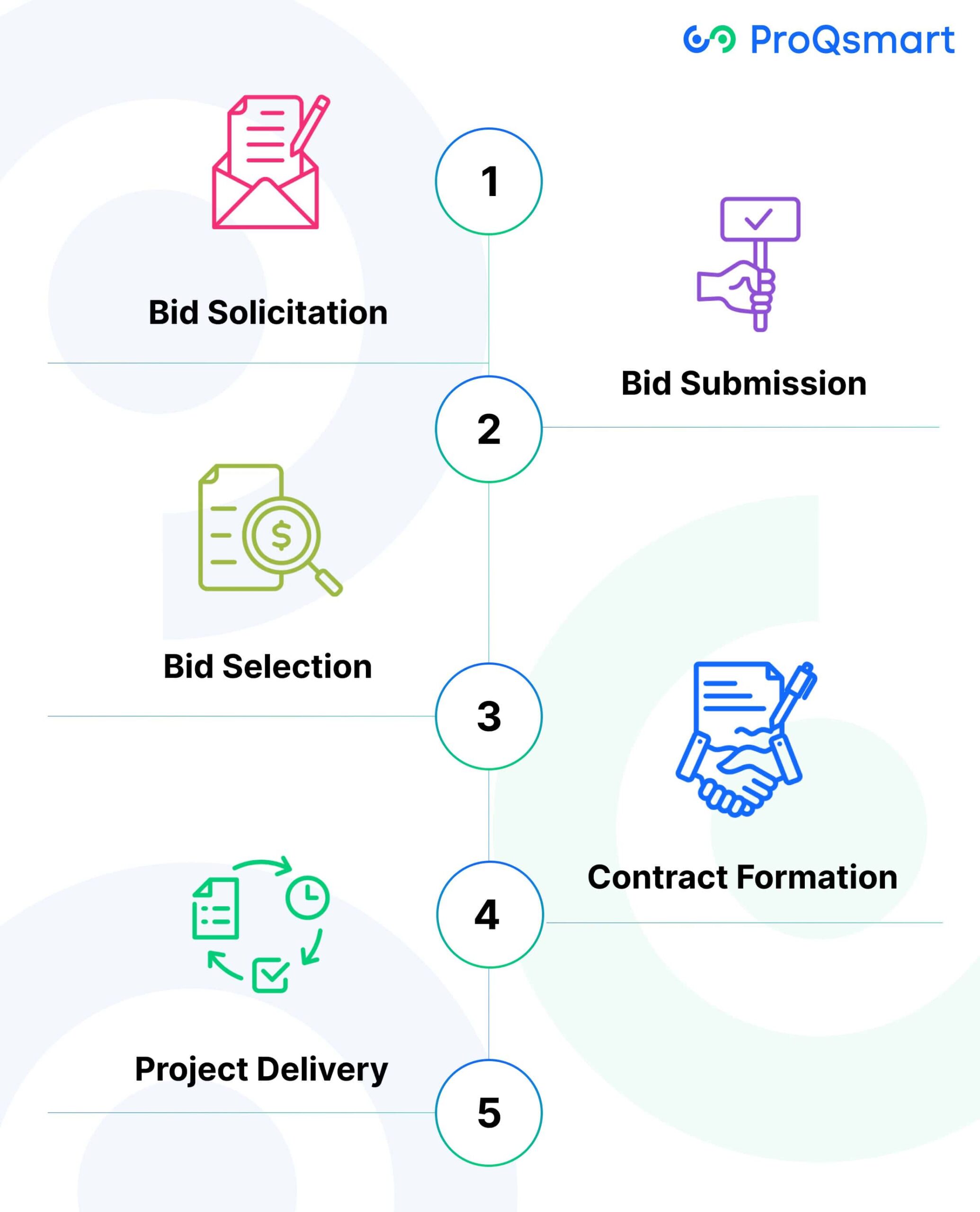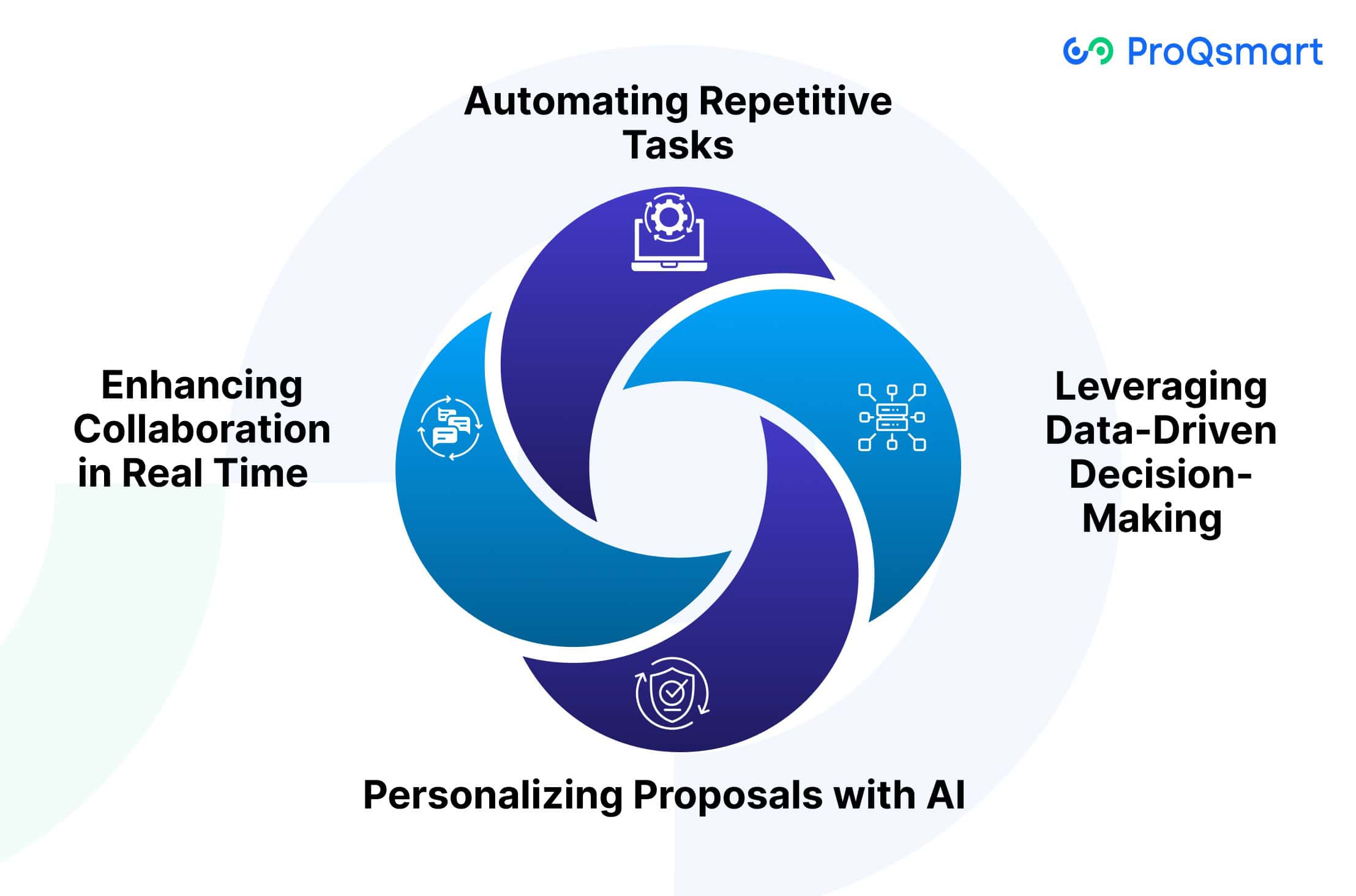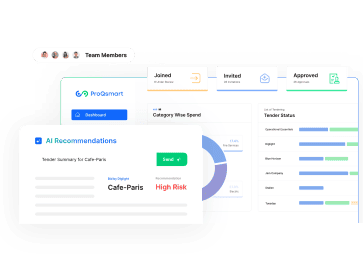Crafting a winning bid proposal is an art that requires precision, strategy, and a deep understanding of the client’s needs. It’s not just about meeting requirements but exceeding expectations. A well-crafted proposal can be the difference between securing a contract and missing out on a valuable opportunity.
To succeed, procurement professionals must master the art of bid writing by focusing on key elements such as client-focused solutions, technical competence, and clear value propositions. Effective strategies include knowing your audience, highlighting unique benefits, and leveraging technology to streamline processes.
In this article, we’ll explore the essential components of a winning proposal, discuss actionable strategies for crafting standout bids, and examine how technology, such as tools offered by ProQsmart, can enhance bid writing processes. By combining these insights with best practices for proposal submission, organizations can significantly improve their chances of securing contracts and driving business growth.
What is Bid Management?
Bid management is the structured process of preparing, organizing, and submitting proposals in response to Requests for Proposals (RFPs) or tenders. It safeguards that each bid meets the client’s requirements, while ensuring the bidder’s strengths are highlighted to win the contract.
The ultimate goal is to produce compelling proposals that meet all requirements, effectively address client concerns, and stand out among competitors. Better bid management means more than just winning more contracts. It helps agencies determine whether a project is even feasible, understand its risks, and plan the right resources at the right time.
Overview of the Bid Management Process

- Bid Solicitation: The bid management process begins with bid solicitation, where organizations issue a request for proposal (RFP), request for quote (RFQ), or invitation for bid (IFB). This phase requires a deep understanding of client needs and specifications to create the foundation for a strong response.
-
Bid Submission: Preparing a robust submission involves organizing the proposal strategically and ensuring it aligns with client requirements. This stage focuses on building trust by delivering a well-structured and compelling proposal.
-
Bid Selection: During this phase, submitted bids are evaluated based on predefined criteria such as cost, quality, and compliance. Transparent communication ensures all stakeholders are aligned throughout the selection process.
-
Contract Formation: Once a vendor is selected, contract terms are negotiated, including timelines, compensation, and resource allocation. This step formalizes the agreement between the client and the contractor.
-
Project Delivery: The final step involves executing the project as per the agreed terms. Deliverables are provided to the client, marking the completion of the project lifecycle.
Key Components of Effective Bidding
Winning bids involve a lot of research, getting to the heart of what a client needs and crafting well thought-out proposals. Strategic planning and resource allocation are just as important, allowing teams to develop competitive bids focused on offering the most complete response to specs.
One of the most impactful steps you can take is developing a storyboard or having an SME participate in storyboarding. ProQsmart’s e-tendering tools encourage collaboration in real-time and automate the pre-qualification process, improving the quality of the winning bid.
Importance of Strategic Bid Management
By ensuring that bids align with their organizations’ business objectives, effective strategic bid management skills will lead to greater win rates. Analyzing opportunities allows bid managers to focus on the most viable options, while continuous improvement in bid strategies adapts to shifting market demands.
Bid Management in Procurement

With the wave of transformation hitting procurement, effective bid management is more essential than ever, serving as a bridge between sourcing opportunities and realizing operational objectives. Bid management is all about getting high-quality proposals in on time and out-competing the competition.
These proposals are competitive, focused on the procurement opportunity, strategically matched to the project needs and agency goals. The procurement landscape is more rapidly changing than ever, thanks to technological innovations such as AI-driven platforms and automation tools.
That’s why embedding bid management practices in procurement processes has truly become a must-have. This convergence goes beyond just winning contracts; it lays the groundwork for better project feasibility analysis and risk mitigation.
Improving Supplier Selection
A strong supplier selection process starts with a data-driven approach. By analyzing key performance metrics and historical data, procurement teams can evaluate suppliers based on their ability to meet project goals.
Setting specific standards like fiscal responsibility, quality metrics, and schedule requirements makes sure they are in line with the goals of procurement. Development, influenced by close collaboration with stakeholder interviewees, helps clarify and narrow the selection process even more.
For example, involving project managers in supplier selection evaluations helps ensure they select the right supplier, which results in better supplier performance down the line.
Streamlining Procurement Processes
Whatever the future holds, streamlining procurement activities starts with taking a best practice approach to bid management. Tools like ProQsmart make it easier to e-tender, automate the workflows and make it possible to monitor supplier performance.
These innovations support even greater collaboration between procurement and bid teams, with improved visibility and centralized communication, as well as dynamic document updating. For instance, real-time collaboration capabilities within ProQsmart ensure all stakeholders can collaborate on meeting bid requirements as quickly as possible, eliminating unnecessary delays.
Negotiating Better Contract Terms
Smart negotiation tactics take advantage of the knowledge acquired during the competitive bidding process. Through prioritizing common goals, entities can realize outcomes that benefit both parties, whether it be cost savings or longer warranty periods.
By documenting lessons from each negotiation, we can continue to refine our practices and move toward a culture of continuous improvement.
Ensuring Compliance and Risk Mitigation
Compliance checks and risk management assessments are integral to bid management skills, especially in regulated industries. ProQsmart’s transparency features ensure adherence to standards while mitigating risks through automated, auditable sourcing data.
How AI is Transforming the Bid Management
AI is revolutionizing bid management by providing sophisticated bid management tools that automate tasks, increase precision, and enable better bid strategy development. With these AI tools, businesses can reduce manual effort and concentrate on crafting data-driven proposals, ensuring a significant competitive edge.
Automation of Repetitive Tasks
AI-powered automation tools can streamline the repetitive processes of document generation, deadline reminders, and compliance reviews. This frees up your time previously spent on administrative tasks.
This way, your teams can spend their time working on the most compelling proposals. Creating responses, for example automating response to a RFP key requirements, summarizing them, creating an RFP requirements compliance document, etc, saving hours of manual work.
ProQsmart includes tools for automating workflows and managing subcontractors. It guarantees compliance with regulations, increasing efficiency and accuracy across the entire bid lifecycle.
Predictive Analytics for Bid Optimization
AI allows for advanced predictive analytics, helping businesses predict the outcome of a bid by studying past data and current market trends. These insights further contribute to the refinement of strategies, enabling teams to craft targeted proposals that resonate with clients’ needs and expectations.
One promising example is ProQsmart, which improves decision-making through the combination of predictive tools with CRM and ERP systems to make sure data flows through them seamlessly.
This method ensures a holistic understanding of proposals, ensuring high-quality proposals as well as data-driven bid/no-bid decisions that optimize winning success rates.
Enhanced Data Analysis and Insights
Advanced AI models analyze historical and current bid data, allowing firms to cultivate more data-driven decision-making practices. Through pattern recognition, efficiency detection and supplier performance evaluation, AI enables continuous learning and improvement.
ProQsmart’s supplier monitoring tools further enable businesses to align bids with both operational goals and client demands, ensuring stronger proposals.
AI-Driven Personalization Strategies
With AI, you can create personalized proposals by analyzing past client behavior and preferences. Providing detailed and targeted responses in bids wins the confidence and attention of clients.
ProQsmart’s real-time collaboration tools enhance relationships by providing transparent and customized solutions.
Key Trends in AI-Powered Bid Management Tools

The integration of AI in bid management has transformed how organizations handle proposals, enabling faster, smarter, and more efficient processes. AI-powered bid management tools meet these challenges head-on by increasing efficiency across the bid management workflow, reducing costs and errors, and boosting team collaboration and communication among bid managers.
Automating Repetitive Tasks
By removing inefficient manual processes that waste time on execution, automation gives teams more time to focus on effective strategy. AI-powered tools can help analyze complex RFP documents within minutes, surfacing key requirements and potential red flags to avoid costly errors.
Take ProQsmart’s e-tendering capabilities—these automate document management, making workflows easier and more efficient while helping you stay organized and compliant. Proposal teams now have the ability to save time by bypassing the headaches of searching through cumbersome, confusing documents.
AI handles these tasks at an unparalleled speed and accuracy.
Leveraging Data-Driven Decision-Making
AI-powered tools provide granular insights into bid performance, using historical data to forecast bid success on future projects. This method manually sharpens bidding strategies, making sure you’ve got a proposal prepared that meets the client expectations and market conditions.
ProQsmart takes this a step further by offering real-time tracking, ensuring procurement activities stay within budget and improve overall cost efficiency. Enhanced accuracy and higher success rates data-driven decision-making improves bid accuracy and boosts success rates, making it the most essential trend in bid management.
Personalizing Proposals with AI
AI-powered personalization further customizes proposals according to individual client requirements, encouraging deeper engagement. AI can create content in a matter of minutes.
With this rapid turnaround, teams can strategically improve and tailor their final proposals often improving quality by as much as 15%. ProQsmart takes this a step further by providing supplier performance monitoring, enabling businesses to better align proposals with consistently high-performing suppliers.
Enhancing Collaboration in Real Time
Today’s AI-powered tools help facilitate this collaboration no matter where teams are located. Instant feedback and automated version history keep teams organized.
ProQsmart encourages teamwork and collaboration by bringing all these features together, allowing your team to work more efficiently and create a cohesive proposal.
Measuring Bid Management Success
Measuring and managing bid management success can help your procurement strategies to stay ahead of the competition and ensure your success. By prioritizing measurable outcomes and actionable insights, you set yourself up for a continuous bid planning process toward more successful bids.
Key Performance Indicators (KPIs)
The key to measuring bid management success is identifying specific KPIs. Win rates are an essential success metric. 15/30 bids awarded would give you a win rate of 50%, even though you were doing better than half the time!
However, these benchmarks can vary. While a 1:5 win rate may work in certain industries, it may fall short in others. Bid accuracy is just as important since mistakes in submitted bids can result in disqualification or expensive re-work.
Moreover, monitoring the average turnaround time to create and submit bids gives a good indication of your operational efficiency. These metrics together can provide a full picture of the impact of your bid management.
Tracking and Analyzing Results
Use smart technology to keep a regular check on and evaluate these KPIs. Platforms like ProQsmart make it easier to track bids with functionalities like e-tenders, document control, and supplier performance tracking.
Additionally, at the same time, AI-driven insights from platforms such as this make real-time collaboration, accurate forecasting, and streamlined workflows to measure campaign success possible. For example, automating bid data analysis helps identify patterns, such as public tenders republished every four years, enabling better resource allocation and strategy alignment.
Correspondingly, conducting a metric check-up regularly keeps you data-driven, allowing you to pivot and adapt as needed to support market demand.
Continuous Improvement Strategies
Success in bid management is not a one-off practice. Developing a systematic process to review performance data and continually improve strategies and tactics is key. Clarity from metrics such as win rates and bid timelines can uncover how your processes should be fine-tuned.
Besides, by replacing siloed, Excel-based legacy and static forecasts with dynamic and exciting new platforms that guarantee continuous, easy-to-action updates, you can enhance your approach. When executed with a solid strategy, this maximizes continuous improvement, boosting win rates by 20% or greater, and demonstrating the power of making improvements.
Integrating Bid Management with Marketing
Increasing efficiency and improving win rates are two key goals for businesses of all sizes. Forward-looking organizations are realizing the power of aligning bid management skills and strategies to work together. This enables them to submit compelling, unified proposals that stand out with clients and evaluators alike.
Aligning Bids with Marketing Goals
In order to make bids work harder and achieve broader marketing objectives, it’s important to weave a cohesive messaging and branding strategy into each proposal. Additionally, a unified tone, visuals, and value propositions helps to establish your organization’s brand identity and maintain a polished, professional look.
When you customize proposals, you highlight your agency’s capacity to address a prospective client’s unique pain points. It shows them that you really know what they need. This personalized process fosters a sense of confidence and intimacy, differentiating your bid from standardized boilerplate bids.
Usually, using tools such as ProQsmart can add significant improvement to this alignment. Integrated with e-tenders and as well as supplier relationship management capabilities, each of your bids will be tailored to coincide with your corporate marketing goals.
Leveraging Data for Targeted Campaigns
Data-driven decision-making is at the heart of effective bid management and marketing integration. Using advanced analytics tools, such as those available in ProQsmart, businesses can explicitly monitor and analyze performance metrics, including conversion rates and customer engagement.
These kinds of insights can be instrumental in identifying trends and patterns, which allows for more effective strategy optimization. According to a recent study, SEM managers can increase campaign efficiency by 25% or more using bid management programs.
They also do this by continuously changing bids based on market trends and consumer demand.
Optimizing ROI Across Channels
Maximizing ROI takes the right technology and true collaboration. Solutions such as ProQsmart reduce manual processes, provide instant tracking and visibility, and improve price transparency.
Utilizing CRM systems and project management tools increase easy dialogue across teams. They assist in creating bids more strategically to work towards the highest return on investment possible while still being compliant.
Conclusion
Under this, bid management is still playing a significant role in strategic procurement, especially as AI powers more intelligent tools and centralized processes. It’s worth noting how these advancements contribute to you saving time, lowering costs, and developing better relationships with vendors. Select the platform that is best suited to your objectives. Then, establish thorough workflows so your agency and the client are always aligned, and deliver results you can measure.
Besides, by tracking success, you are making sure that your approach remains the most effective and adaptable strategy. By integrating with marketing, you can also take that collaboration a step further and increase visibility across teams. When paired with the proper practices, bid management turns into one of the crucial largest engines of expansion and procurement efficiency.
Ready to revolutionize your procurement strategy? ProQsmart offers cutting-edge tools to streamline your bid management workflow, overcome procurement challenges, and maximize efficiency. Book a demo with ProQsmart today!




